
The Pomo are a Native American people of California. Historical Pomo territory in Northern California was large, bordered by the Pacific Coast to the west, extending inland to Clear Lake, mainly between Cleone and Duncans Point. One small group, the Tceefoka, lived in the vicinity of present-day Stonyford, Colusa County, were they were separated from the majority of Pomo lands by Yuki and Wintuan speakers.

The Kashia Band of Pomo Indians of the Stewarts Point Rancheria is a federally recognized tribe of Pomo people in Sonoma County, California. They are also known as the Kashaya Pomo.
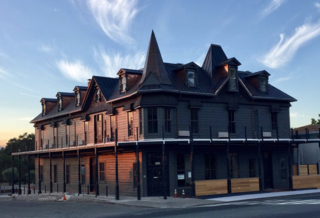
Hopland is a census-designated place in Mendocino County, California, United States. It is located on the west bank of the Russian River 13 miles (21 km) south-southeast of Ukiah, in the Sanel Valley, at an elevation of 502 feet (153 m). The population was 661 at the 2020 census, down from 756 at the 2010 census.

The Guidiville Rancheria of California are a federally recognized Pomo tribe located in Mendocino County, California.
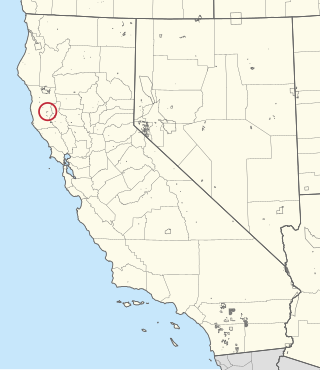
The Redwood Valley Rancheria is a federally recognized Indian tribe located in Redwood Valley, Mendocino County, California. The tribe is primarily composed of Pomo Indians. Redwood Valley Rancheria is a sovereign Indian tribe with the powers of self-governance.

The Big Valley Band of Pomo Indians of the Big Valley Rancheria is a federally recognized tribe of Pomo and Pit River Indians, with a reservation located in Lake County, California, near the town of Finley. They conduct tribal business from Lakeport, California.
The Manchester Band of Pomo Indians of the Manchester Rancheria, formerly named the Manchester Band of Pomo Indians of the Manchester-Point Arena Rancheria, is a federally recognized tribe of Pomo Indians in California. The tribe is a community of Pomo Native Americans who are native to Northern California. The Bokeya society are enrolled in the Manchester Band of Pomo with the approval of their constitution and by-laws in 1936.
The Cloverdale Rancheria of Pomo Indians of California is a federally recognized tribe of Pomo Indians in California. The tribe is currently considered "landless", as they do not have any land that is in Federal Trust. In 2008 they acquired approximately 80 acres (32 ha) of property on the southern end of Cloverdale, California. The property is currently going through the Fee to Trust process to become the tribe's landbase.
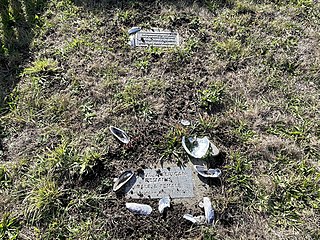
The Sherwood Valley Rancheria of Pomo Indians of California is a federally recognized tribe of Pomo Indians in California.
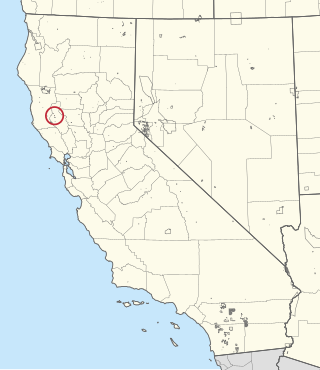
The Habematolel Pomo of Upper Lake is a federally recognized tribe of Pomo Indians in Lake County, California. The tribe's reservation, the Upper Lake Rancheria, is 119 acres (0.48 km2) large and located near the town of Upper Lake in northwestern California.
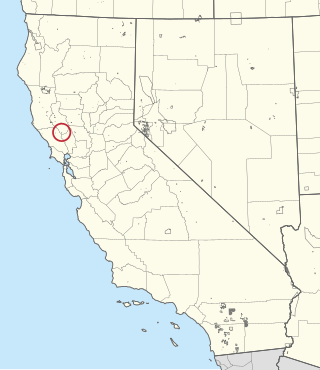
The Middletown Rancheria of Pomo Indians of California is a federally recognized tribe of Pomo Indians, as well as some Wappo and Lake Miwok Indians, in California, headquartered in Middletown, California.

The Robinson Rancheria of Pomo Indians of California is a federally recognized tribe of Eastern Pomo people in Lake County, California.

The Pinoleville Pomo Nation is a federally recognized tribe of Pomo people in Mendocino County, California. Leona Williams serves as Tribal Chairperson.
The Potter Valley Tribe is a federally recognized tribe of Pomo people in Mendocino County, California. They were previously known as the Little River Band of Pomo Indians and Potter Valley Rancheria of Pomo Indians of California. The tribe is descended from the first-known inhabitants of the valley, which the Pomo called Ba-lo Kai. Europeans first settled there, at the headwaters of the East Fork of the Russian River, in 1852.

The Dry Creek Rancheria Band of Pomo Indians is a federally recognized tribe of Pomo people, an indigenous people of California. It has a reservation near Geyserville, California, in Sonoma County, where it operates the River Rock Casino Resort.
The Yocha Dehe Wintun Nation is a federally recognized tribe of Wintun people, specifically Patwin people or southern Wintun, in Yolo County, California. They were formerly known as the Rumsey Indian Rancheria of Wintun Indians of California.
Tillie Hardwick was a Pomo Indian woman who was instrumental in reversing the California Indian Rancheria termination policy of the U.S. government.

Luwana Quitiquit was a Native American administrator, activist, and basket weaver. During the Occupation of Alcatraz she worked as one of the cooks who provided food to those living on the island. Her career was as an administrator for various California Indian organizations. Subsequently, she became a well-known doll maker, basketweaver, jeweler, and teacher of Pomo handicrafts. In 2008, she and her family were disenrolled from the Robinson Rancheria of Pomo Indians of California. She fought the action claiming it was politically motivated until her death. Posthumously, in 2017, her membership, as well as for her other family members, was reinstated in the first known case where a tribe reversed its decision on membership termination without a court ruling.













